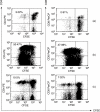Sublingual therapeutic immunization with a polyvalent bacterial preparation in patients with recurrent respiratory infections: immunomodulatory effect on antigen-specific memory CD4+ T cells and impact on clinical outcome
- PMID: 21391984
- PMCID: PMC3074222
- DOI: 10.1111/j.1365-2249.2011.04320.x
Sublingual therapeutic immunization with a polyvalent bacterial preparation in patients with recurrent respiratory infections: immunomodulatory effect on antigen-specific memory CD4+ T cells and impact on clinical outcome
Abstract
Recurrent respiratory tract infections (RRTIs) are common clinical conditions in individuals with alterations of the immune function. A prospective open pilot study in a cohort of patients with RRTIs has been performed to assess whether sublingual immunization with a polyvalent bacterial vaccine could exert an immunomodulatory effect on the antigen-specific immunological responses and have an impact on the clinical outcome. Seventeen patients with RRTIs were recruited. An oral polyvalent bacterial preparation (Bactek®) was administered to all patients daily for 6 months. Immunological assessment was performed at baseline and at the end of immunization. Immunological measurements included: T cell-specific proliferations of CD3+CD4+ and CD3+CD8+ to Bactek® antigens, total immunoglobulin levels, antibodies to pneumococcal polysaccharide and tetanus toxoid and B, T and natural killer (NK) cell subsets. There was a significant increase in the proliferative capacity of CD3+CD4+ T cells specific to Bactek® antigens at month 6 in comparison to baseline (P < 0·0001). A significant increase in total CD3+ T cells was also observed (P < 0·05). No significant differences were observed between baseline and month 6 in levels of total immunoglobulins, specific antibodies and B, T or NK cell subsets. A significant reduction in the patient's rate of RRTIs was observed compared with 1 year prior to initiation of therapy (P < 0·0001). The results demonstrate that long-term administration of a sublingual polyvalent bacterial preparation in patients with RRTIs exerts an immune stimulating effect on CD4+ T helper cell responses to bacterial antigens which could be associated with clinical benefit.
Figures

References
-
- Felmingham D, Feldman C, Hryniewicz W, et al. Surveillance of resistance in bacteria causing community-acquired respiratory tract infections. Clin Microbiol Infect. 2002;8(Suppl. 2):12–42. - PubMed
-
- Collet JP, Shapiro P, Ernst P, Renzi T, Ducruet T, Robinson A. Effects of an immunostimulating agent on acute exacerbations and hospitalizations in patients with chronic obstructive pulmonary disease. The PARI-IS Study Steering Committee and Research Group. Prevention of acute respiratory infection by an immunostimulant. Am J Respir Crit Care Med. 1997;156:1719–24. - PubMed
-
- Rozy A, Chorostowska-Wynimko J. Bacterial immunostimulants – mechanism of action and clinical application in respiratory diseases. Pneumonol Alergol Pol. 2008;76:353–9. - PubMed
-
- Bellanti JA, Settipane RA. Bacterial vaccines and the innate immune system: a journey of rediscovery for the allergist–immunologist and all health care providers. Allergy Asthma Proc. 2009;30(Suppl. 1):S3–4. - PubMed
Publication types
MeSH terms
Substances
LinkOut - more resources
Full Text Sources
Medical
Research Materials

